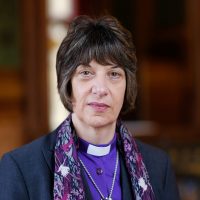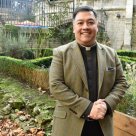 Sunday 26 January
Sunday 26 January
It brought me deep joy yesterday morning to be with a group of clergy and laity on the final day of a two-year programme called THRIVE as they continued to reflect together on what it means to be the Church in their different contexts. At the heart of it is the generous love of God, and as we gathered in a room with a roaring fire, I reflected on continuing to fan into flame the gift of God within us as we live and share the transforming gospel of Jesus Christ.
The bishops of the Church of England are also coming towards the end of a two-year programme. ‘Living in Love and Faith‘ is a project which will result in the production of ‘resources that will help the Church to learn how questions about human identity, relationships, marriage and sexuality fit within the bigger picture of what it means to embody a Christian vision of living holy lives in love and faith in our culture’. It is led by the bishops and therefore I was deeply frustrated and saddened in the way that the House of Bishops statement re civil partnerships was published on Thursday. I recognise that it has fanned into flame unnecessary pain and distress and I wish to acknowledge my part in that.
I cannot deny seeing the content of the statement at the meeting of the House of Bishops in December and in terms of factual content the statement is reiterating that in the light of the recent change in law allowing civil partnerships to be extended to opposite-sex couples, nothing has changed regarding the legal and doctrinal position of the Church of England. There should have been no surprises for anyone in that. However, I am complicit in making wrong assumptions in December and not asking questions about how this statement was to be used. For me, the publication of the statement in cold isolation from anything else, on a seemingly random day and lacking any pastoral ‘surround’ or mention of the Living in Love and Faith’ process, has been perplexing and upsetting. This is even more so as it has been released just days before the College of Bishops convene once more to focus on ‘Living in Love and Faith’ as we stand in the present looking to both the past and the future.
This week the bishops will continue what has been a process of openness, vulnerability, and often robust disagreement in a place of trust and relationship, rooted in scripture, prayer and the vision of the kingdom of God. This is also the week when we will formally leave the EU, and as bishops we have been urging people to fan into flame the spirit of reconciliation. The word ‘love’ emanating from the generous love of God is one that needs to be heard and lived and I am extremely sorry that it has not been heard in the publication of the House of Bishops statement.
This week I will actually be the bishop on duty in the House of Lords and I will be reflecting even more deeply on what it is I should and should not be fanning into flame.
Today many worshipping communities gather as members together of the body of Christ, and in our brokenness we will remember Christ’s body broken for us and for our broken world. As we are nourished in broken bread and wine out-poured may we be sent out to nourish the world, living out Christ’s love and hope among the people and places of our week.
Friday 31 January
Bishop Rachel and Bishop Robert commend this statement to you following the recent meeting of the College of Bishops
Statement from Archbishop Justin and Archbishop Sentamu following the College of Bishops Meeting
We as Archbishops, alongside the bishops of the Church of England, apologise and take responsibility for releasing a statement<https://www.churchofengland.org/more/media-centre/news/civil-partnerships-opposite-sex-couples> last week which we acknowledge has jeopardised trust. We are very sorry and recognise the division and hurt this has caused.
At our meeting of the College of Bishops of the Church of England this week we continued our commitment to the Living in Love and Faith project<https://www.churchofengland.org/LLF> which is about questions of human identity, sexuality and marriage.
This process is intended to help us all to build bridges that will enable the difficult conversations that are necessary as, together, we discern the way forward for the Church of England.
















Dear Bishop Rachel, I was shocked and saddened to read the statement on civil partnerships. I felt like weeping. As an open evangelical, I realise that my own position of wanting the church to be inclusive is a minority one, but I felt we were inching towards a greater acceptance. My first thought (again) was how can I be part of the Anglican Church when I differ so fundamentally on this issue? How can I ever be reconciled with my sisters and brothers who read the Bible so differently from me? But after a joyful service of Holy Communion this morning with my church family, I know that Christ can bring us together. Thank you for acknowledging the hurt that some of us feel, and may we journey on, together.
The Anglican Chur Union is following a social trend and not the teaching of the Gospel. We need to remember that we follow a Gospel that changes a world and not a gospel of the world that tries to change the Gospel of Christ. It is but an aberration of socially focused minds who have forgotten what the Gospel truly teaches
you are not alone …
Thank you Bishop Rachel. This recent statement and its timing has been badly timed. Sadly the world will criticise and Christians may be divided, especially those of us who are LGBT. I doubt it will bring many to know Christ. Those of us who are in a CP and who minister to others have been, and are, loved in our communities and churches. We must focus on love because the sex word is uttered inappropriately and is irrelevant when we consider Gods love for us all no matter who we are, it’s love that matters, not sex.
Why should the bishops be denying civil partners the power of loving relationships by requiring them to be celibate???
This is just another example of how the church continues to cause division in the world. Religions , all of them, are responsible for the wars and extremism everywhere in the world.
Once again the bishops display with their mealy mouthed words that they are anything but loving and open to all people. They hide behind theological clap trap!
What on earth does this waffle mean!
The usual from the Church’s management. You either accept people can have consensual sex outside marriage or you are still in the middle ages and irrelevant to modern life – your choice.
I go with Billy.
Thank you for this. It explains a lot and lessens the shock and disappointment that the Archbishop’s statement caused. I hope it will be widely read, by people gay and straight, in and outside the Church: it is essential that we all do what we can to undo the harm done by the statement, and so much that preceded it.
This brought tears to my eyes and heart. Thank you for your kinds words of reconciliation who were left wondering where we belong as a result of the Bishop’s Statement.
Thankyou for your words, a vicar friend once said I can bless a piece of wood but I can’t bless you, how sad,ive always been a Christian and in a civil partnership with my partner of 34 years,but I now feel I have no choice left to me but to leave my church where we have always been excepted and held positions on various committees, a sad day, but to say I have to be treated sympathetically and pastoraly is the final nail in the coffin
What part of “Love one another even as I have loved you” have the Bishops failed to understand?
The statement by the House of Bishops is unexceptionable. You cannot make Christianity something other than what it is with regard to the traditional teaching about the sanctity and character of marriage as between a man and a woman for life with the intention, if possible, of having children. Such a marriage also mirrors the profound relationship between God and human beings and between Christ and the Church. It is very important that this is upheld unequivocally to give young people the opportunity to form stable and loving marriages in the interests of children.
This is what divides the two sees of Bristol and Gloucester. Next to each other but Gloucester seems to me always behind the times. I live in Bristol Diocese which I feel happier with. Just personal choice, but it matters to me. God Bless all who have been upset but politics in the Church of England can be quite divisive if one lets them be, so find a church which suits x
“nothing has changed regarding the legal and doctrinal position of the Church of England. There should have been no surprises for anyone in that”
It was a surprise for me actually. I keep hoping that the C of E will be a beacon of God’s overwhelming love for us, and instead it gets tangled up in in pettiness and hand-wringing which only serves to further empower the dominant hetero normative patriarchal society.
How many people who wrote that statement and prayed over it had ever experienced homophobic abuse? How many of them had felt excluded by the language of the church?
I don’t think your statement is robust enough in its rejection of the tone and language of the statement.
I think, and continue to hope and pray, that we can all do better.
That the normative place for sexual intercourse is in marriage between a man and a woman–a teaching common to Christianity for thousands of years–causes “pain and distress” suggests that perhaps Bishop Rachel would feel better in the “Church of Nice rather than a Christian one.
The House of Bishops Statement on Civil Partnerships is, I imagine, a formal statement that sets out both the Church of England’s teaching on marriage and the implications of this for the extending of Civil Partnerships to heterosexual couples. Its purpose is not to be a document that gives guidance as to the ethical and pastoral implications of the teaching.
It is a great pity that the Bishop of Gloucester has parted company to some degree from its findings, although she has endorsed its basic teaching on the sanctity and wholesomeness of marriage as understood by Christians.
More worrying are most of the comments that respond to her statement. Unfortunately, they fail to understand what lies behind the institution of marriage as a fundamental part of the fabric of human life experienced in social communities.
The gist of the comments is that Christians have to accept the current ethos of Western culture with its emphasis on individual choice in matters of sexuality and sexual relations with others.
They do not conceive of the existence of a God who has created all humans in his image and, therefore, knows best how human lives flourish to their optimum. If they believe in God at all, it is likely to be a God who indulges their whims, allowing and even blessing their strongest desires. For some, though not for the Bishop of Gloucester, this is what loving someone seems to imply.
The Christian faith, however, has a much fuller picture of the nature of God. Yes, of course, he is love personified, but it is a love that upholds the standards necessary for humans to thrive in all the ways that make them the most beautiful they can be. He has come into the world, sacrificing himself, to put to rights everything that destroys human dignity and worth. This is what the church seeks to uphold, although sadly it often fails to do so, by living according to the new order that God is creating in the midst of the old.
The church has always said that the there is a cost to following the way of Jesus Christ, who confirmed the ordinance of marriage and the blessings that it brings, especially to any offspring that may be conceived thereby.
Basically, the church sets forth a reality that in many ways contradicts the belief that we can benefit by creating a lifestyle for ourselves that does not accord with our very best interests. It has a responsibility to maintain and share this vision and to live it out in full, by God’s amazing grace.
The Bishops’ Statement is meant to uphold this vision for the sake of declaring how people may live in a way that ultimately will afford them the greatest contentment. The experience of all who allow Jesus to mould their lives is that it represents the very best they could hope for.
It is a tragedy that so many do not understand that the Bishops’ intention is one sign of their concern that people may experience real joy in their lives.
Very well said Andrew.